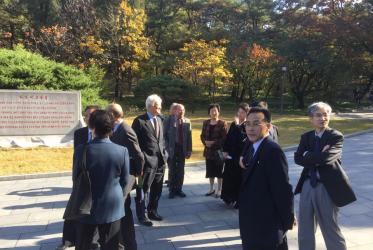Displaying 881 - 900 of 1346
Tveit on the “Ten Commandments” of food
26 January 2016
New video presents Ecumenical Advocacy Alliance’s call to action
13 January 2016
One refugee’s story: from Syria to France
07 January 2016
Consultation considers right to food in context of climate change
15 December 2015
During visits, Greek archbishop urges action on refugee crisis
10 December 2015
COP21: how climate change affects access to our daily bread
09 December 2015
Faith leaders urge action at UN climate talks
02 December 2015
Patent agreement welcomed as step to improve HIV treatment
30 November 2015
UN Climate summit results vital for world’s future
26 November 2015
Land rights focus of panel discussion
17 November 2015











